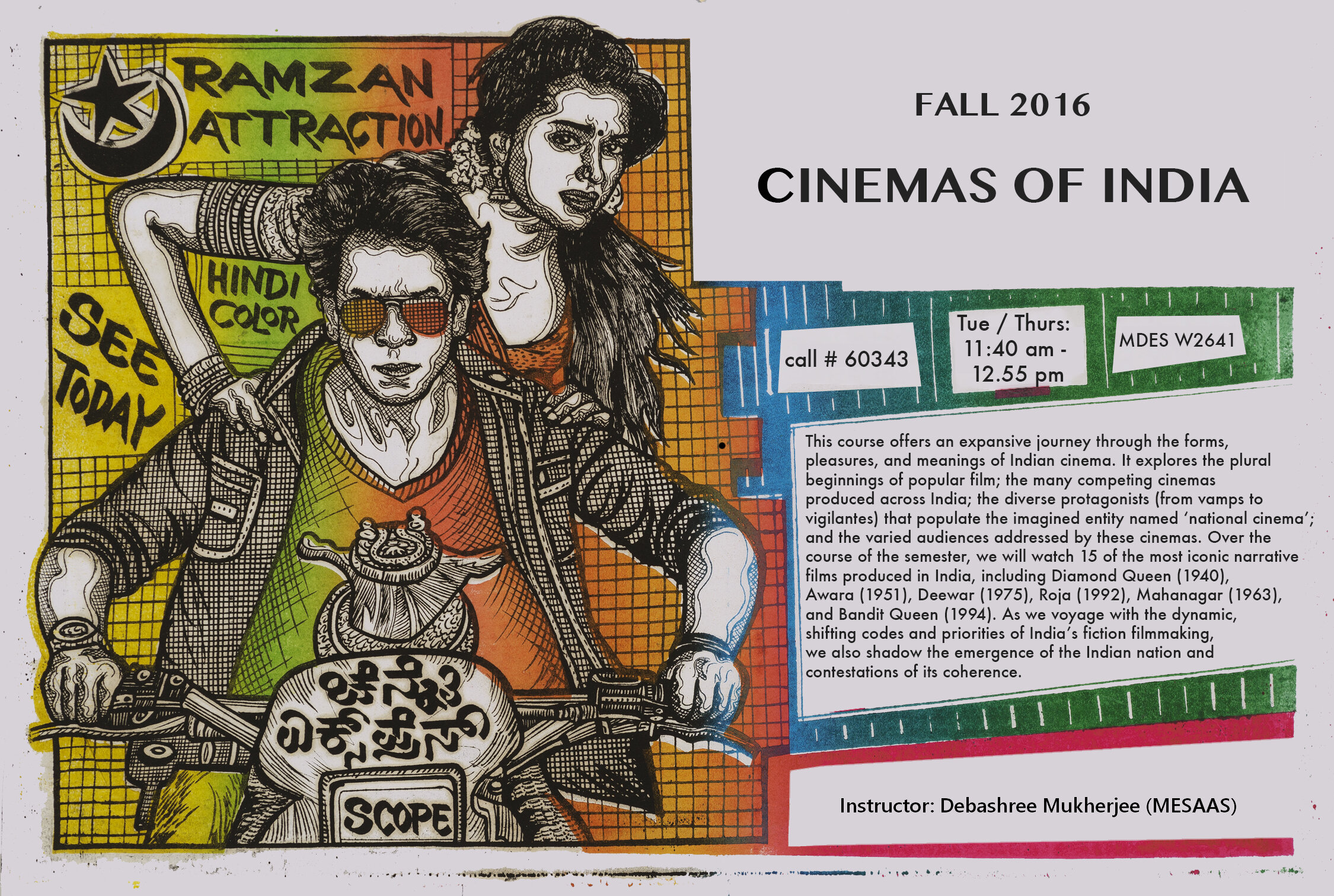
COURSES
Cinemas of India
This undergraduate lecture course offers an expansive journey through the forms, pleasures, and meanings of cinema from India. Over the course of the semester, we will watch and discuss commercial, avant garde, documentary, and independent films to understand the diversity of film forms, imaginations, and audiences that constitute the category “Indian cinema”. Any historical survey of Indian cinema must grapple with the emergence of the Indian nation and contestations of its coherence. Thus, each week we will foreground political landmarks, historical events, and deep social conflicts of gender, class, caste, and religion that shape the nature of Indian democracy and can be studied through a cinematic lens.
Cinematic Cities | Comparative Modernities
This seminar explores the representational, imaginative, and analytical connections between cinema and the urban experience. Theories of modernity frequently hold up the city as the most emblematic site for locating the modern. Cinema, too, as art and apparatus, can be said to have embodied the ‘shocks’ of the modern. This course introduces students to a significant corpus of literature on cinema and mediated urbanisms. By insisting on a comparative approach, the seminar seeks to put existing theories of cinematic urbanisms that pertain to Berlin, Paris, or Los Angeles, into dialogue with ‘other’ cinematic sites such as Mumbai, Algiers, Mexico City, Istanbul, or Dakar.
Camera in the Tropics
This graduate seminar situates the history of photography within the history of colonial productions of tropicality, and the concomitant occupation of tropical places. Specific regimes of vision accompanied the European conquest of peoples and lands, undergirded the racialization of bodies, and colluded in epistemic binaries of centers and peripheries. At the same time, modern visual media did not possess an intrinsically “colonial gaze.” Rather, many of the same apparatuses of seeing and representation proved to be powerful tools in the assertion of minoritized selves, be it in fugitive , playful, or explicitly confrontational forms. Our focus will be on 19th-20th century lens-based image production, particularly photography. Weekly readings are curated as per a spatial logic, retracing the itineraries of colonial adventurism and control: from the ship to the island, the plantation, the prison, and the laboratory.
Visual Cultures of Modern South Asia
This lecture course introduces students to the power and meaning of popular visual culture. Using South Asia as our primary site, we will examine visual culture as a crucial arena for the enactment of social transformations and the creation of collective imaginaries. We will track modern media types such as calendar art, photography, film, architecture, clothing, and religious festivals, loosely following key chronological signposts in the shared histories of the subcontinent. Together, we will practice a new way of understanding history and society – a visual way that will make us aware of the diversity of hopes, fears, and dreams that comprise South Asia.
Media Materialisms
This advanced graduate seminar offers a survey of debates on materiality and object-oriented ontologies that are currently revitalizing the humanities and social sciences. How does the physical world of objects and things affect our social and perceptual reality? Is it possible to imagine a world with the nonhuman at its center? Should we learn to study a “thing in itself” or is it better to approach matter as always-already entangled in networks and relations? In this interdisciplinary seminar we will keep media objects and contexts at the center of our study and travel through a long history of critical interest in materialism. The seminar begins with foundational debates from Marx to MacLuhan and gradually moves through modules on materialism as understood vis-a-vis things, actors, relations, bodies, images, infrastructures, aesthetics, and ecologies.
Cinema & Colonialism in SA
What is the relation between cinema and colonialism? This seminar approaches cinema as a dynamic historical agent that aided, negotiated, refracted, and contested the mechanisms and meanings of colonialism in South Asia. We will study cinema as technology, as industry, and as cultural form, paying attention to questions of film finance, on-screen representation, production infrastructures, circuits of distribution, and sites of exhibition. We will watch films made by British ethnographers, Indian expats, Hollywood orientalists, and South Asian nationalists to study how film served as a key weapon of imperial propaganda as well as anticolonial resistance. This is a history of cinema as a history of empire; where cinema is not just a text to be read but a cultural, industrial, and social network of power relations.